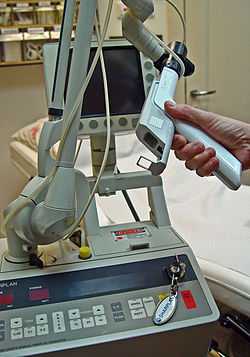Otolaryngology


Otolaryngology /ˌoʊtoʊˌlærɪŋˈɡɒlədʒi/, is the study of ear, nose, and throat conditions or ENT (ear, nose, and throat). It is also referred to as Otolaryngology-Head and Neck Surgery or Otorhinolaryngology. It is the oldest medical speciality in the United States, where nearly 50 percent of all office visits pertain to the ear, nose, and throat.[citation needed]
Physicians specializing in otolaryngology are called otolaryngologists or by the nickname "ENTs" or "ENT doctors" and often treat children with persistent ear, nose, and throat conditions to include surgery. Adult patients often seek treatment from an otolaryngologist for sinus infections, age-related hearing loss, and cancers of these regions.
Training
Otolaryngologists are physicians (MD, DO, MBBS, MBChB, etc.) who, in the United States, complete at least five years of surgical residency training. This is composed of one year in general surgical training and four years in otolaryngology–head and neck surgery. (In the past it varied between two and three years of each.) In Canada, practitioners complete a five-year residency training after medical school.
Following residency training, some otolaryngologists complete an advanced sub-specialty Fellowship where training can be 1–2 years in duration. In the United States, otolaryngology is one of the most competitive specialties in medicine in which to obtain a residency position following medical school.
Sub-specialties
| Head and Neck Oncologic Surgery | Facial Plastic and Reconstructive Surgery* | Otology | Neurotology* | Rhinology and Sinus Surgery | Laryngology and Voice Disorders | Pediatric Otolaryngology | Sleep Medicine* |
| Surgical oncology | Facial cosmetic surgery | Ear | Middle and inner ear | Sinusitis | Voice disorders | Velopalatine insufficiency | |
| Reconstruction | Maxillofacial | Hearing | Temporal bone | Allergy | Phono-surgery | Cleft lip and palate | |
| Endocrine surgery | Trauma | Balance | Skull base | Anterior skull base | Swallowing disorders | Airway | |
| Endoscopic Surgery | Dizziness | Apnea and snoring | Vascular malformations | ||||
| Cochlear implant/BAHA |
(* Currently recognized by American Board of Medical Subspecialties)
Topics in Otolaryngology, Head and Neck Surgery
|
Head and neck oncology
- Squamous cell carcinoma of the oral cavity, pharynx and larynx
- Oral cancer
- Skin Cancer of the head & neck
- Thyroid cancer
- Endocrine surgery of the head and neck (thyroidectomy, parathyroidectomy)
- Microvascular free flap reconstruction
- Skull base surgery
- Salivary gland cancer
Otology and Neurotology
- Dizziness
- BPPV – benign paroxysmal positional vertigo
- Labyrinthitis/Vestibular neuronitis
- Ménière's disease/Endolymphatic hydrops
- Perilymphatic fistula
- Acoustic neuroma
- Hearing loss
- Mastoiditis
- Otitis externa – outer ear or ear canal inflammation
- Otitis media – middle ear inflammation
- Perforated eardrum (hole in the eardrum due to infection, trauma, explosion or loud noise)
- Ear surgery
Rhinology
Rhinology pertains to sinus diseases and the anterior skull base.
- Sinusitis – acute, chronic
- Environmental allergies
- Rhinitis
- Pituitary tumor
- Empty nose syndrome
- Severe or recurrent epistaxis
Pediatric Otolaryngology
- Adenoidectomy
- Caustic ingestion
- Cricotracheal resection
- Decannulation
- Laryngomalacia
- Laryngotracheal reconstruction
- Myringotomy and tubes
- Obstructive sleep apnea – pediatric
- Tonsillectomy
Laryngology
- Dysphonia/hoarseness
- Laryngitis
- Reinke's edema
- Vocal cord nodules and polyps
- Spasmodic dysphonia
- Tracheostomy
- Cancer of the larynx
- Vocology – science and practice of voice habilitation
Facial Plastic and Reconstructive Surgery
Facial Plastic and Reconstructive Surgery is a one-year fellowship open to otolaryngologists and plastic surgeons who wish to specialize in the aesthetic and reconstructive surgery of the head, face, and neck.
- Rhinoplasty and septoplasty
- Facelift (rhytidectomy)
- Browlift
- Blepharoplasty
- Otoplasty
- Genioplasty
- Injectable cosmetic treatments
- Trauma to the face
- Nasal bone fracture
- Mandible fracture
- Orbital fracture
- Frontal sinus fracture
- Complex lacerations and soft tissue damage
- Skin cancer (e.g. Basal Cell Carcinoma)
See also
- American Board of Otolaryngology
- American Osteopathic Board of Ophthalmology and Otolaryngology
- Head mirror
- Surgeon
- Audiology
- Oral and maxillofacial surgery
- Speech-language pathology
References
External links
Associations and Societies
- American Academy of Otolaryngology-Head and Neck Surgery
- American Laryngological, Rhinological and Otological Society (The Trilogical Society)
- American Head and Neck Society
- British Association of Otorhinolaryngologists-Head and Neck Surgeons
- Australian Society of Otolaryngology-Head and Neck Surgery
- Canadian Society of Otolaryngology–Head and Neck Surgery
- The Voice Foundation
- American Society of Pediatric Otolaryngology
- International Federation of Oto-rhino-laryngological Societies
- American Academy of Facial Plastic and Reconstructive Surgery
- American Academy of Otolaryngic Allergy
- American Broncho-Esophagological Association
- American Laryngological Association
- Society for Ear, Nose and Throat Advances in Children
- European Federation of Otorhinolaryngological Societies
- American Rhinologic Society
- American Otological Society
Journals
- Journal of the Association for Research in Otolaryngology
- Otolaryngology-Head and Neck Surgery
- Journal of Voice
- Logopedics Phoniatrics Vocology
- Journal of Laryngology and Otology
- TWJ Foundation